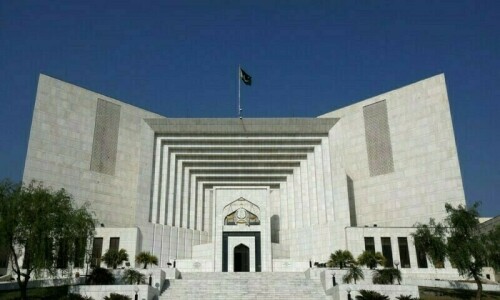ISLAMABAD: A full court meeting of the Islamabad High Court (IHC) will deliberate upon proposals on Tuesday (today) to finalise the same before their submission to the Supreme Court in a matter related to the alleged meddling by personnel of intelligence agencies in judicial affairs.
Interestingly, six of the eight IHC judges who will take stock of the issue and come up with recommendations are themselves the complainant in this regard before the Supreme Judicial Council (SJC).
According to a notice circulated among all the eight judges by the IHC registrar office, the meeting will be convened on April 23, at 2:30pm.
The Supreme Court had initiated suo motu proceeding on the letter of six of the eight IHC judges against the alleged meddling in the judicial affairs. In its April 3 order, the SC called for proposals from the main stakeholders in the judicial system and the independence of judiciary, namely the Pakistan Bar Council (PBC), Supreme Court Bar Association (SCBA), high courts and the federal government.
Proposals to be submitted to apex court may be finalised by 25th
“They should suggest what should be the institutional response and mechanism to address the issues like the ones raised in the letter [of IHC judges] and ensure that such issues do not arise in future and, if they do, to fix liability and proceed against those responsible,” the order stated. In any such process, it added, the idea was to empower the high courts and their chief justices to deal with issues relating to the judges.
Since the apex court had sought the proposal by April 25, sources said the IHC registrar office circulated the apex court order among the judges and sought their final proposal by the deadline. The IHC administration will then file a consolidated report to the SC.
Initially, a seven-member larger SC bench had conducted a hearing on the suo motu proceedings.
Justice Yahya Afridi, however, recused himself from hearing this case, stating: “This may affect the functioning of the worthy chief justice and judges in their discharge of judicial functions, and would to my mind amount to interference in the independence of high courts.”
“To proceed on the proposed action of suo motu would negate the lessons moved into action by public sentiments no matter how pressing the issue may appear,” Justice Afridi emphasised, adding that one must also not ignore that the high courts under the Constitution were independent establishments envisaged to regulate not only their administrative functions, but also provide security to and safeguard the judicial officers in the discharge of their judicial functions.“
In their letter, Justice Mohsin Akhtar Kayani, Justice Tariq Mehmood Jahangiri, Justice Babar Sattar, Justice Sardar Ejaz Ishaq Khan, Justice Arbab Mohammad Tahir and Justice Saman Rafat Imtiaz had hinted at the alleged involvement of ISI in judicial matters.
Published in Dawn, April 23rd, 2024














































Dear visitor, the comments section is undergoing an overhaul and will return soon.